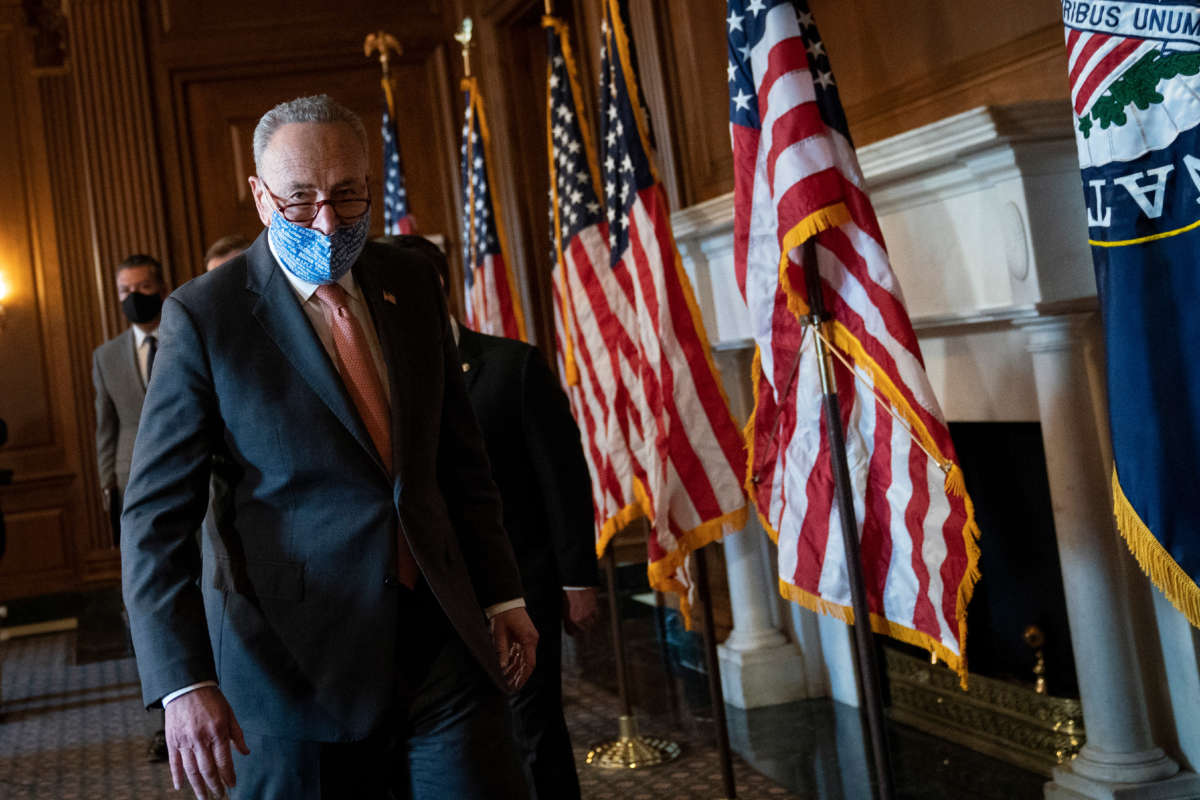Did you know that Truthout is a nonprofit and independently funded by readers like you? If you value what we do, please support our work with a donation.
Senate Majority Leader Chuck Schumer (D-New York) said Thursday that a budget resolution for a coronavirus economic stimulus bill could be brought forward as early as next week.
Speaking on the floor of the Senate, Schumer expressed a “preference” of working with Republicans to pass a new coronavirus economic relief package, but added that if Republicans block or stall the effort, or if they only lend support to a smaller dollar amount, that Democrats would move forward without their support.
Schumer emphasized the importance of offering a generous aid package. While offering little detail, Schumer said the eventual bill would be “bold” and “robust.”
“The dangers of undershooting our response are far greater than overshooting,” he said.
The Senate “as early as next week will begin the process of considering a very strong COVID relief bill,” the majority leader added.
If the Democrats move the bill ahead without Republican support, they will need to use a budgetary procedure called reconciliation, a process that allows lawmakers to pass legislation by a simple majority, and thus avoid needing 60 votes in order to break a filibuster. A budget resolution is the first step in that process. After such a resolution is passed, all of the committees involved in the bill would be responsible for developing different aspects of the bill, which would then be put together in a larger bill for the legislative chamber to consider.
Schumer alluded to the possibility of using reconciliation for the coronavirus relief bill in a conference call to Senate Democrats earlier this week. Speaker of the House Nancy Pelosi has also told lawmakers in her legislative chamber to prepare for the reconciliation process.
While Pelosi stated in a “dear colleague” letter on Wednesday that Democrats “hope and expect Republicans in Congress will support assistance that will bring relief to their communities,” she also stated that Democratic committee chairs are “working on coronavirus relief legislation as a basis for reconciliation, should that step be needed.”
“Democrats will not take any tools off the table as to how the House and Senate can get this package done,” Pelosi added in her letter.
The size of the stimulus package has not been determined, but it will likely be similar in scope to the proposal put forward by President Joe Biden earlier this month, which called for $1.9 trillion in total spending. The bill proposed by the president would include $1,400 payments to every eligible American, including those who had received similar $600 payments at the start of the year, plus others who were left out of that round of payments.
Some have been critical of Biden’s plan for failing to go far enough. In mid-January, after Biden revealed his proposal, several progressive voices, including Rep. Alexandria Ocasio-Cortez (D-NY), pointed out that Biden had promised to provide $2,000 payments, not just a $1,400 payment that would make up the difference after the last round of relief checks.
“$2,000 means $2,000. $2,000 does not mean $1,400,” Ocasio-Cortez said at the time.
Media that fights fascism
Truthout is funded almost entirely by readers — that’s why we can speak truth to power and cut against the mainstream narrative. But independent journalists at Truthout face mounting political repression under Trump.
We rely on your support to survive McCarthyist censorship. Please make a tax-deductible one-time or monthly donation.
